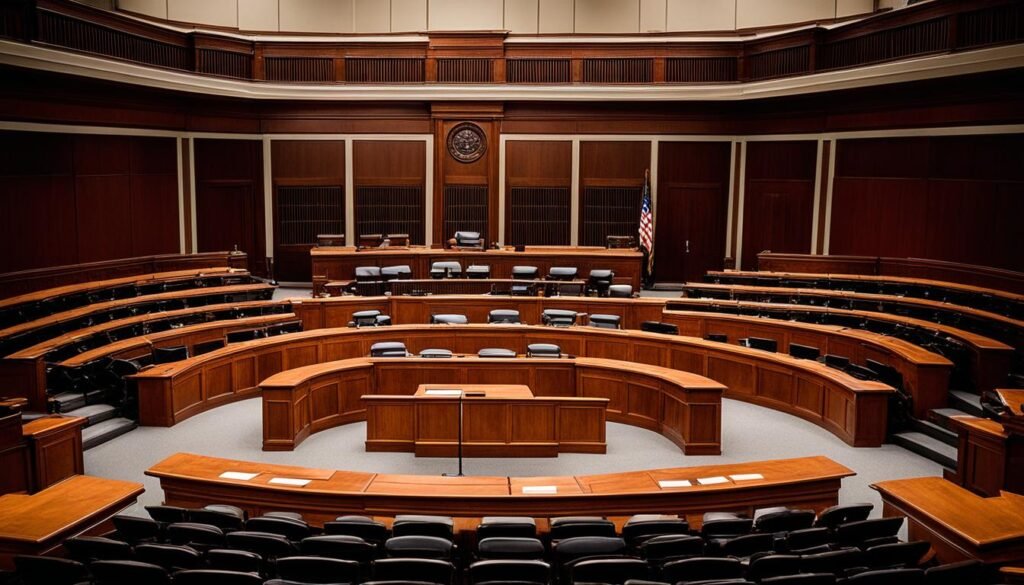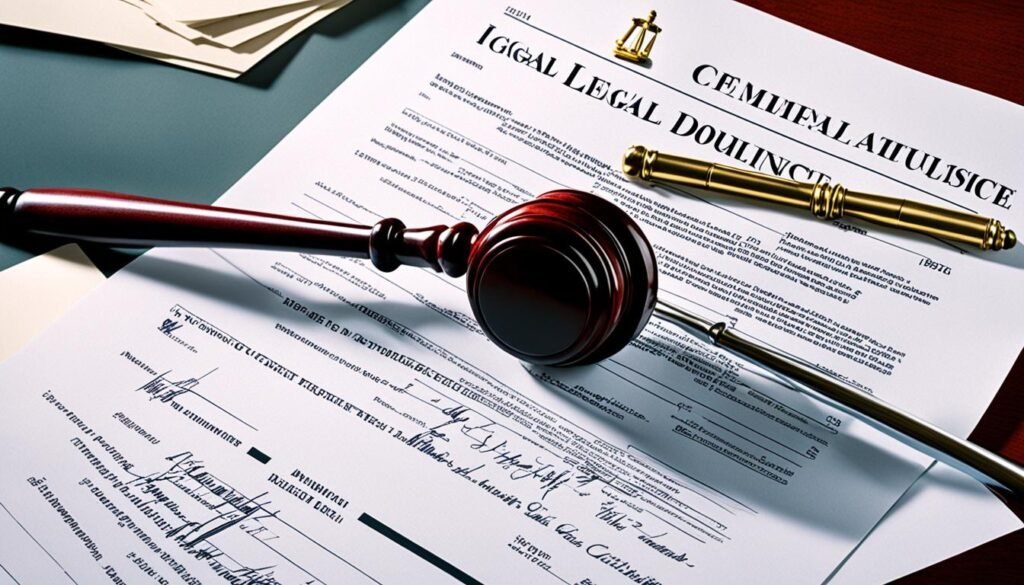An attorney, or lawyer, represents people or groups in legal affairs. They give advice, fight for their clients, and are experts in law. Their job is key in making sure justice is served and that the rules of law are followed. Attorneys also guide their clients on what they should or should not do legally.
Also Read: Inside The Courtroom: An In-depth Look At Judicial Proceedings
Key Takeaways
- Attorneys are licensed professionals who represent individuals and organizations in legal matters.
- Attorneys provide legal counsel, advocacy, and expertise to protect the interests of their clients.
- The role of an attorney is essential in modern legal systems, ensuring justice and upholding the rule of law.
- Attorneys advise clients on their legal rights and obligations, helping them navigate complex legal landscapes.
- Attorneys play a crucial role in various areas of law, including civil, criminal, corporate, and more.
Introduction to the Role of an Attorney
Attorneys, or lawyers, are very important in legal systems today. They give legal help and advice to people, businesses, and groups. Their job is to understand and use laws, protect their clients’ rights, and help in legal matters.
Also Read: The Concept Of Justice: Philosophical And Ethical Perspectives
Definition of an Attorney
An attorney is a legal expert licensed to practice law. Their work involves explaining and using laws, helping clients in legal cases, and telling them their legal rights and duties. Attorneys make sure laws are followed and their clients are looked after.
Importance of Attorneys in Legal Systems
Attorneys keep legal systems fair and just. They work to ensure laws are applied correctly and their clients’ rights stay protected. By offering legal advice and being there in court, attorneys make sure their clients understand their legal options.
Overview of Responsibilities
Attorneys do a lot of different things based on their specialty. They might explain laws, write legal papers, make deals, go to court for clients, and suggest legal moves. No matter what, attorneys aim to act with the utmost honesty and professionalism.
Professional Conduct and Ethical Duties

The legal profession is run by strict rules and ethical codes. Lawyers must follow these to keep the justice system fair. The Rules of Professional Conduct guide them on how to act and the ethical rules to follow.
Also Read: How Does Passing the CPA Exam Impact Your Career?
Rules of Professional Conduct
The American Bar Association (ABA) created the Model Rules of Professional Conduct. These are the backbone of ethics in law. They guide lawyers on being competent, talking, keeping things secret, and avoiding conflicts of interest. Lawyers need to know these rules well and make sure they follow them in their work.
Maintaining Competence and Diligence
Lawyers must always provide their clients with skillful and devoted help. They should know the laws, rules, and legal ways very well. It’s important for lawyers to keep learning to keep up with any changes.
They also need to spend a lot of time getting ready for each case. This makes sure they can do everything for their clients.
Confidentiality and Safekeeping of Client Information
The bond between a lawyer and their client is based on trust. It’s vital for lawyers to keep everything about their clients a secret. This includes client information, talks, and other private details. They must work hard to keep this information safe, both in their offices and online.
Client Representation and Advocacy

Every lawyer’s main job is to support their clients. They do this by advising, representing in court, and negotiating. These are important for helping people with their legal issues.
Also Read: The Top 10 Universities Worldwide Offering Scholarships
Advising and Counseling Clients
Lawyers give crucial legal advice. They explain complex laws in a way their clients can understand. This helps clients know what choices they have.
Representing Clients in Legal Proceedings
In court, lawyers stand up for their clients. They prepare for court very well. This includes researching, gathering evidence, and planning arguments.
Negotiating Settlements and Alternative Dispute Resolution
Sometimes, avoiding court is best. Lawyers help clients use other ways, like mediation. They work hard to find solutions that all parties can agree on.
Legal Research and Analysis

Attorneys are key in making laws clear to their clients. They dive deep into laws, rules, and past decisions. This work is essential in guiding their clients through legal matters and representing them.
Interpreting Laws, Regulations, and Precedents
Attorneys need to fully understand relevant laws and rules. They carefully study legal texts and their meanings. This helps them to correctly apply these laws to each case.
Also Read: 10 Best Universities In The World For Scholarships
Conducting Thorough Legal Research
Doing good legal research is vital for attorneys. They use various sources like legal databases and court documents. Through thorough research, they find the best laws and strategies for their clients.
Analyzing Legal Issues and Developing Strategies
Attorneys evaluate legal problems and the possible results for their clients. This step is crucial in forming solid legal plans. These plans might include talking things out, finding alternative solutions, or going to court.
Attorney

Attorneys are key in our legal systems. They often focus on particular practice areas to offer complete legal help. A lawyer’s duties change based on what they practice. But, most handle making legal documents, talking through contracts, standing for folks in court, and giving sound legal tips.
Roles and Responsibilities in Different Practice Areas
Lawyers might choose to work in criminal, corporate, intellectual property, or family law. Duties can vary widely. They usually involve understanding laws, doing research, and crafting strategies to protect their clients’ needs.
A criminal defense attorney might aim to make their client’s case strong. They prepare for trial, question witnesses, and fight for their client in court. A business lawyer, on the other hand, often deals with drafting agreements, advising on business deals, and making sure laws are followed.
Specialized or not, attorneys always need a deep grasp of laws, and what’s new in their field. This equips them to give smart advice and representation for the best outcomes.
Attorney-Client Relationship and Communication
The bond between an attorney and a client is about trust and being open. Lawyers must understand what their clients need and aim for. Then, they can tailor their legal plans.
Good, clear communication matters a lot. Lawyers need to share updates on a case, any law changes, and the pros and cons of choices. This keeps clients in the loop and helps them feel in control.
Also, keeping each client’s details private is a must. A lawyer’s job is to keep info secret and live up to the legal profession’s ethical rules. This also helps keep the lawyer-client relationship strong.
Courtroom Representation and Litigation

Preparing for Trials and Hearings
Attorneys get ready for court by doing a lot of work. They research laws, gather evidence, and prepare witnesses. They also create strong arguments for their case. Being good at legal writing, trial prep, and case management is key.
Presenting Evidence and Arguments
In court, attorneys work hard to win over the judge and jury. They show evidence and make strong arguments. They also speak clearly and understand the law well. This helps them represent their client’s stance effectively.
Cross-Examination and Witness Handling
Attorneys must be great at questioning witnesses from the other side. They challenge what’s said to support their client. This requires good evidence skills and knowing how to manage witnesses. They also make sure their own witnesses are ready to speak in a way that helps their case.
Legal Documentation and Transactions

Attorneys do a key job in creating and checking various legal papers to keep their clients safe. They work on things like contracts, wills, trusts, and complex legal tools. Attorneys make sure these documents are clear and exact thanks to their knowledge.
Drafting Contracts, Wills, and Legal Documents
Creating legal documents means capturing what clients want and keeping their rights safe. Attorneys need know-how about laws, good writing, and thinking skills. They need to be very careful to prevent mistakes or unclear parts that could cause problems later.
Reviewing and Negotiating Agreements
Attorneys also review and negotiate deals for their clients, not just write documents. They check contract details, spot risks, and try to get better terms. Great negotiation and communication skills are a must to stand up for what their clients need.
Ensuring Compliance with Regulations
Attorneys must make sure all their work follows the law. They stay informed on legal changes and give clients advice to meet requirements. This keeps their clients from dealing with legal troubles and lessens risks.
Continuing Legal Education and Professional Development

Being a lawyer means keeping up in a fast-changing legal world. This is a key part of their job. They must always be learning to serve their clients well.
Staying Up-to-Date with Legal Changes
The laws are always changing, with new rules and decisions coming up all the time. Lawyers need to know these changes to help their clients. They read legal magazines, keep an eye on new laws, and attend special classes to keep up.
Attending Seminars and Conferences
Going to seminars and conferences is really helpful for lawyers. They learn new things, meet other lawyers, and hear about the latest legal stuff. At these events, they listen to experts, join group talks, and do activities that help them share their knowledge.
Pursuing Specializations and Certifications
Some lawyers decide to get more special training in certain areas. This can mean getting certificates or even higher degrees in law. It makes them better at what they do and shows they really know their stuff. For example, knowing a lot about taxes, patents, or international deals can make them really good at those types of cases.
| Continuing Legal Education (CLE) Requirements by State | Hours Required per Reporting Period | Ethics/Professionalism Credits |
|---|---|---|
| California | 25 hours every 3 years | 4 hours |
| New York | 24 hours every 2 years | 4 hours |
| Texas | 15 hours annually | 3 hours |
| Florida | 33 hours every 3 years | 5 hours |
| Illinois | 30 hours every 2 years | 6 hours |
Also Read: Individual Rights And Liberties In Constitutional Law
Conclusion
Attorneys play a central role in our legal systems today. They are key, linking people, organizations, and laws. They offer crucial advice, fight for their clients, and guide them through legal processes and transactions.
Attorneys fulfill many tasks like explaining and using laws and representing clients in court. They ensure justice is fair for all. With a strong sense of ethics and ongoing learning, they offer top-notch legal services. This helps uphold the law and lets their clients make smart choices.
The legal field is always changing. Yet, attorneys’ skills and ability to adjust are key. They protect both individuals and groups’ rights and interests. Thanks to their drive for justice and excellence, lawyers are vital in our modern world.
FAQs
Q: What is the role of a lawyer in modern legal systems?
A: Lawyers are legal professionals who provide advice, represent clients in court, and ensure that legal procedures are followed.
Q: How does an attorney differ from a solicitor?
A: In some countries, such as the United States, the terms “attorney” and “lawyer” are used interchangeably, while “solicitor” refers to a specific type of lawyer in other legal systems like in the UK.
Q: What are the responsibilities of an attorney on behalf of their clients?
A: Attorneys act on behalf of their clients to provide legal representation, give legal advice, negotiate settlements, and advocate for their clients’ interests.
Q: How can I find an attorney for my legal needs?
A: You can find an attorney by asking for referrals from friends and family, using online directories, contacting your local bar association, or seeking recommendations from other legal professionals.
Q: What is the difference between an attorney and a barrister?
A: In some legal systems, like in the UK, barristers specialize in courtroom advocacy and advising clients on legal matters, while attorneys have a broader scope of legal practice.
Q: What qualifications are required to become an attorney?
A: To become an attorney, one typically needs to graduate from law school, pass the bar exam in their jurisdiction, and adhere to the ethical standards and regulations of the legal profession.
Q: How does the attorney general fit into the legal system?
A: The attorney general is the chief legal officer of a government, responsible for representing the state in legal matters, providing legal advice to government agencies, and upholding the rule of law.
Source Links
- https://www.clio.com/blog/rules-of-professional-conduct-for-lawyers/
- https://www.tealhq.com/career-paths/lawyer
- https://www.bls.gov/ooh/legal/lawyers.htm





